“There is a saying that says with the gavel giving and God begging, so I believe that when a man works, makes an effort, there is the hand of God,” says Mauricio Estrada Príncipe, a 59-year-old man who was imprisoned for drug trafficking and who Now he plants, in the Amazon of Peru, world-class organic aromatic cocoa, which is exported to France to make the best chocolate.
Mauricio, married for 22 years and father of four children, shares his story with EWTN News: a life marked by poverty, some unfortunate decisions and the return to God that allowed him to transform everything.
Receive the main news from ACI Prensa by WhatsApp and Telegram
It is increasingly difficult to see Catholic news on social media. Subscribe to our free channels today:
Poverty and bad decisions
“I come from a very poor family economically. At 16 years old I assumed responsibility for my home. I have five brothers and one sister. “My father taught me to work but he didn’t teach me to dream,” says Mauricio Estrada.
“I started looking for a living and stopped studying,” he continues and remembers that “in those times there was an opportunity to excel economically, back in 1980, where drug trafficking in the area where I lived began to grow: everyone worked in that and me too, but not with the desire to be a trafficker or get into drugs, but to bring bread to my home.”

“I became totally involved in drug trafficking, without having learned anything else, until I was arrested at the border, in Iquitos, involved with an impact gang,” confesses Mauricio Estrada.”
The return to God
“Thank God, prison separated me from everything and there I learned to value life, people, time: I learned to know God, I learned to exercise my faith,” says Estrada, who had been sentenced to 25 years in prison. although he could have left earlier.
In prison, he says, he and other inmates understood that they were “dangerous, but God called us to freedom and we can change our lives by obeying what the Word of God says.”
There, thanks to the accompaniment of some animators who visited the prison and some priests who went occasionally, “I began to recognize God, to walk and lived with him, I was blessed in the prison and I began to stand out, I began to change, my behavior and I understood that the man on drugs lives with a curse his entire life because he only dedicates himself to selling poison.”
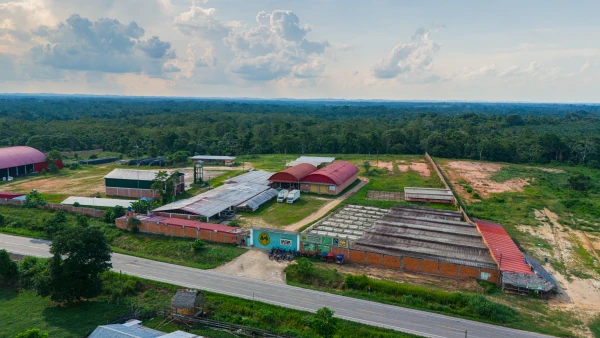
Mauricio Estrada left prison at the age of 36, still single, with the clear idea of starting a home, “already prepared to be a husband.” “Thank God I have been able to climb from where I was,” he adds.
“I told God: I don’t want to be on drugs. I want to have a decent job to bring bread to my children and tell them that it is the result of a decent job that God blesses us with. “In that way I abandoned the coca plantations, everything illicit.”
The organic aromatic cocoa alternative
Organic aromatic cocoa appeared in his life back in 2012, an activity to which he dedicates, as he says, 80% of his work time. The other 20% is invested in fish farming.
Mauricio admits that at that time organic cocoa was not seen as a profitable alternative, but little by little he and others began to dedicate themselves to planting the fruit from which chocolate is obtained.
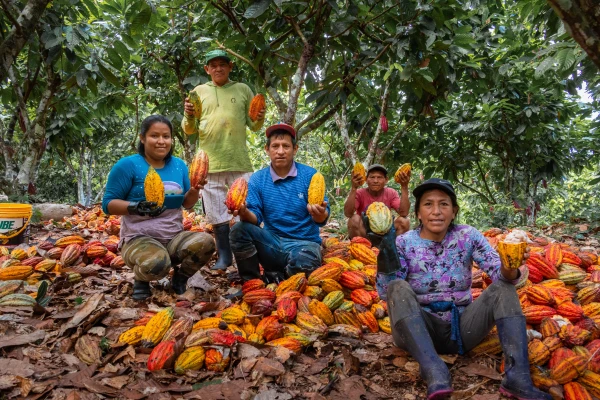
“Many resisted and some continue to resist and live a chaotic life (…) Now almost 90% of the Ucayali jungle are cocoa farmers,” he says.
The Colpa de Parrots and Cáritas cooperative of Peru
Mauricio Estrada shares with ACI Prensa that he was later able to join the Colpa de Coros Cooperative, which brings together some 500 organic cocoa producers in Ucayali, who receive training and support from various Cáritas del Perú agents, in collaboration with the Food for the Poor institution, which finances the project.
According to its website, Food for the Poor It is an institution that makes no distinction between religions or beliefs. It was founded in 1982 with the intention of responding to the “moral duty” to “clothe and feed the poor (Matthew 25:40)” to “preserve human dignity and care for those in need.” It carries out various aid and development projects in several Latin American countries such as Haiti, Dominican Republic, Honduras, Mexico, Colombia, Guatemala, El Salvador, Ecuador, Panama and Peru.
Mauricio Estrada, who is now a collaborator on the administrative council of the cooperative, appreciates the intense work of Cáritas del Perú to produce cocoa, which is “a very good food and must be prepared very well. I thank the cooperative and thanks to the NGOs that support us,” he adds.
The work of Cáritas del Perú
Jorge Gordillo Lázaro, project coordinator, explains to EWTN Noticias that work in Ucayali began in 2022 with Food for the Poor and the Colpa de Loros cooperative, which was formed in 2015 after the invitation of the French chocolate company Kaoka, which buys in the entire production of organic aromatic cocoa, which must also meet high quality standards such as the non-use of synthetic or chemical fertilizers.
“From 2015 to date, only the cooperative has been able to sell an average of 500 to 600 tons of cocoa beans, of the 1,800 tons that Kaoka requires. However, Kaoka knows well that in their origins these producers have not been cocoa farmers but are ex-coca growers, whose coca leaf cultivation has been eradicated,” explains the coordinator.
Kaoka, points out their websiteis a French company that produces high-quality chocolate, with 30 years of experience, committed to protecting the environment. In addition to Peru, the cocoa they use is planted in Ecuador, Sao Tomé and the Dominican Republic. In collaboration with cocoa producers in these years they have managed to plant more than 750,000 trees.
The area in which the 500 cocoa producers of Colpa de Loros are established is located in the district of Nechuya, in the province of Padre Abad, Ucayali region, and in other districts of Padre Abad such as Curimaná, San Alejandro, Von Humboldt and others. that belong to the region of Puerto Inca, Huánuco.
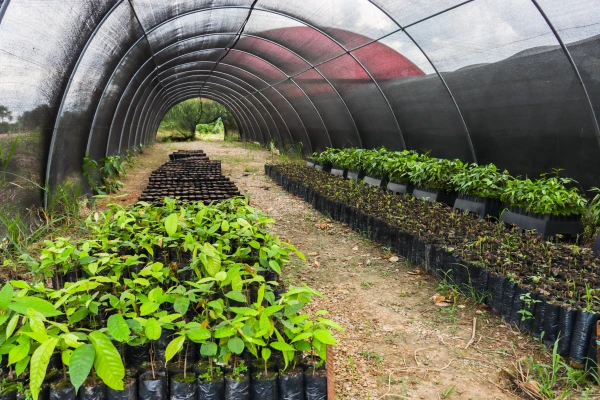
The idea of the cooperative and Cáritas del Perú is to obtain between 800 and 1,000 kilos per hectare, something that also contributes economically to the lives of the producers, who began selling a kilo of cocoa for between 18 and 20 soles (about 5 dollars), and who now receive between 80 and 100 soles (between 20 and 25 dollars) per kilo.
Cáritas del Perú also encourages producers to work in a way that protects the environment, as Pope Francis constantly encourages to take care of the common home.
“All the producers of the cooperative have the goal of installing about 100 annual trees, which are not only timber trees but also fruit trees and other species for environmental conservation,” says Jorge Gordillo.
Cáritas accompanies the work of producers with six field technicians and with training to constantly improve their crops. In addition to the technicians, they have the help of engineers from the University of Ucayali, the University of Tingo María, and the Agrarian University, the latter in Lima.
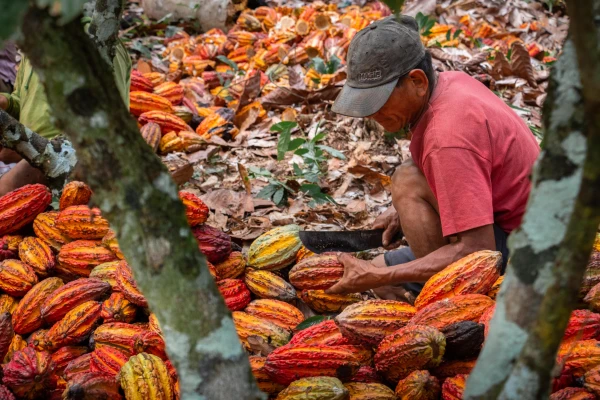
This, highlights Jorge Gordillo, allows “to give them talks and see the reality of other places. That is why in two years we have done around six internships so that they can see and confirm that in some plots up to 3 thousand kilos of organic cocoa have been produced.”
“The cooperative has 4 organic seals and every bean that goes to Europe has its quality guaranteed and has no trace of chemicals,” he emphasizes and explains that for each ton of cocoa bean accepted, the buyer pays an additional 240 dollars, which also serves to the training of producers.
The future
The coordinator of this project tells EWTN News that they now have between 60 and 70 pre-members for the cooperative, who must go through a series of filters to be able to plant and produce organic cocoa.
“For a partner to join, it is only accepted when the soil analysis is done and it has been proven that their land and their product can provide this quality,” he highlights. “Kaoka has renewed its contract for 10 years, until 2034. We are an exclusive cooperative for them,” he emphasizes.
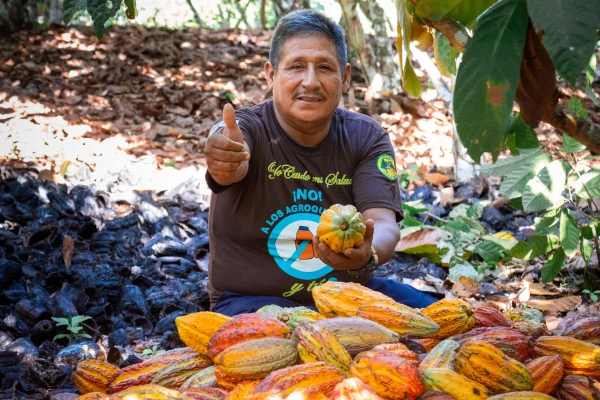
Jorge Gordillo finally highlights that “Cáritas is the social arm of the Catholic Church to bring relief to those most in need and that is why we work” in Ucayali. Producers, he continues, still have shortcomings but “they have improved their position. We see that cocoa has improved its price. “In a few years we will be telling another success story from other producers, former coca growers.”
A final thought
Mauricio Estrada, former coca grower, family man and producer of one of the best cocoas in the world, shares with EWTN News: “Today I am blessed, my faith is always alive. I have good ideas to continue building my home, my children and society as well.”
For this reason, he concludes, he frequently prays the Rosary as a family and “we seek God every day, in the mornings.”
togeltogel hari initogel hongkong

